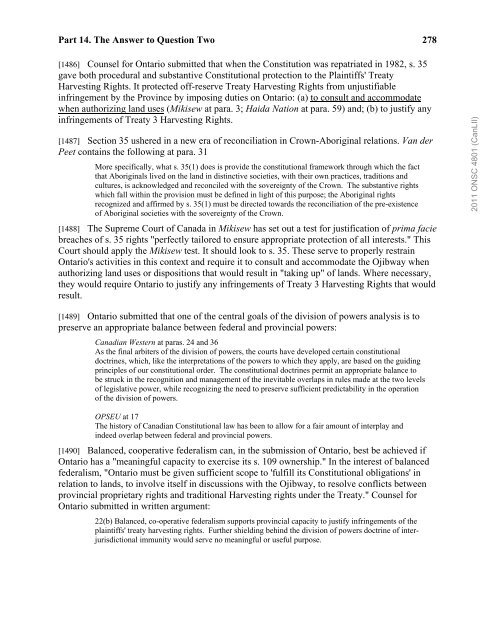Keewatin v. Minister of Natural Resources
Keewatin v. Minister of Natural Resources
Keewatin v. Minister of Natural Resources
- No tags were found...
You also want an ePaper? Increase the reach of your titles
YUMPU automatically turns print PDFs into web optimized ePapers that Google loves.
Part 14. The Answer to Question Two 278[1486] Counsel for Ontario submitted that when the Constitution was repatriated in 1982, s. 35gave both procedural and substantive Constitutional protection to the Plaintiffs' TreatyHarvesting Rights. It protected <strong>of</strong>f-reserve Treaty Harvesting Rights from unjustifiableinfringement by the Province by imposing duties on Ontario: (a) to consult and accommodatewhen authorizing land uses (Mikisew at para. 3; Haida Nation at para. 59) and; (b) to justify anyinfringements <strong>of</strong> Treaty 3 Harvesting Rights.[1487] Section 35 ushered in a new era <strong>of</strong> reconciliation in Crown-Aboriginal relations. Van derPeet contains the following at para. 31More specifically, what s. 35(1) does is provide the constitutional framework through which the factthat Aboriginals lived on the land in distinctive societies, with their own practices, traditions andcultures, is acknowledged and reconciled with the sovereignty <strong>of</strong> the Crown. The substantive rightswhich fall within the provision must be defined in light <strong>of</strong> this purpose; the Aboriginal rightsrecognized and affirmed by s. 35(1) must be directed towards the reconciliation <strong>of</strong> the pre-existence<strong>of</strong> Aboriginal societies with the sovereignty <strong>of</strong> the Crown.[1488] The Supreme Court <strong>of</strong> Canada in Mikisew has set out a test for justification <strong>of</strong> prima faciebreaches <strong>of</strong> s. 35 rights "perfectly tailored to ensure appropriate protection <strong>of</strong> all interests." ThisCourt should apply the Mikisew test. It should look to s. 35. These serve to properly restrainOntario's activities in this context and require it to consult and accommodate the Ojibway whenauthorizing land uses or dispositions that would result in "taking up" <strong>of</strong> lands. Where necessary,they would require Ontario to justify any infringements <strong>of</strong> Treaty 3 Harvesting Rights that wouldresult.2011 ONSC 4801 (CanLII)[1489] Ontario submitted that one <strong>of</strong> the central goals <strong>of</strong> the division <strong>of</strong> powers analysis is topreserve an appropriate balance between federal and provincial powers:Canadian Western at paras. 24 and 36As the final arbiters <strong>of</strong> the division <strong>of</strong> powers, the courts have developed certain constitutionaldoctrines, which, like the interpretations <strong>of</strong> the powers to which they apply, are based on the guidingprinciples <strong>of</strong> our constitutional order. The constitutional doctrines permit an appropriate balance tobe struck in the recognition and management <strong>of</strong> the inevitable overlaps in rules made at the two levels<strong>of</strong> legislative power, while recognizing the need to preserve sufficient predictability in the operation<strong>of</strong> the division <strong>of</strong> powers.OPSEU at 17The history <strong>of</strong> Canadian Constitutional law has been to allow for a fair amount <strong>of</strong> interplay andindeed overlap between federal and provincial powers.[1490] Balanced, cooperative federalism can, in the submission <strong>of</strong> Ontario, best be achieved ifOntario has a "meaningful capacity to exercise its s. 109 ownership." In the interest <strong>of</strong> balancedfederalism, "Ontario must be given sufficient scope to 'fulfill its Constitutional obligations' inrelation to lands, to involve itself in discussions with the Ojibway, to resolve conflicts betweenprovincial proprietary rights and traditional Harvesting rights under the Treaty." Counsel forOntario submitted in written argument:22(b) Balanced, co-operative federalism supports provincial capacity to justify infringements <strong>of</strong> theplaintiffs' treaty harvesting rights. Further shielding behind the division <strong>of</strong> powers doctrine <strong>of</strong> interjurisdictionalimmunity would serve no meaningful or useful purpose.
















